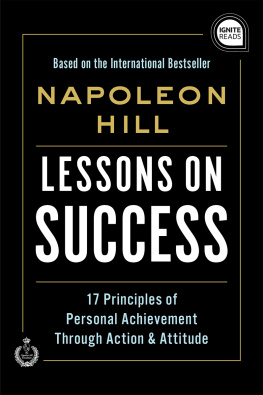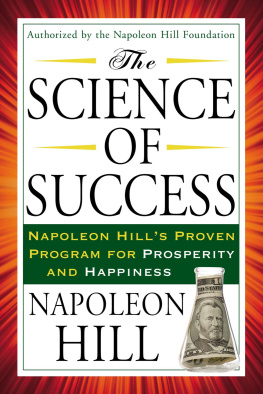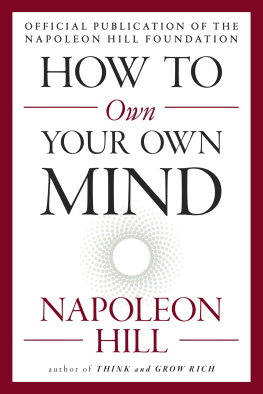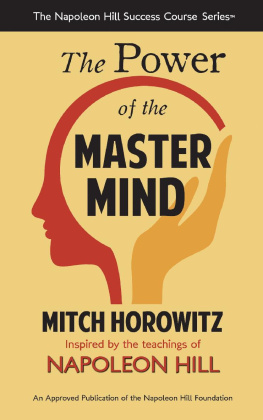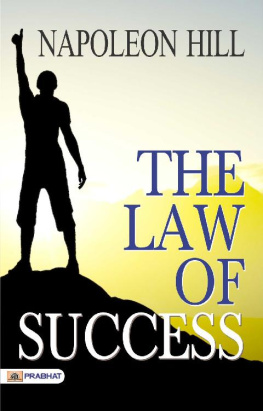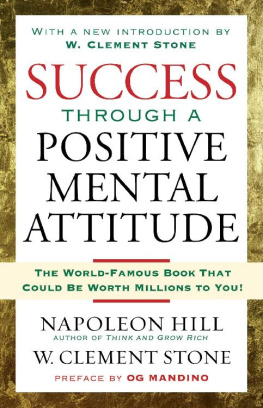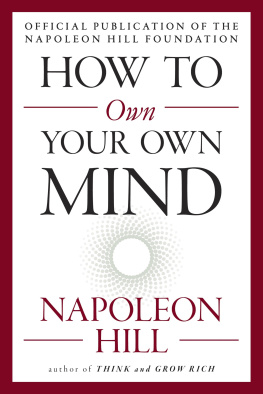Lesson 1 The Master Mind
You Can Do It if You Believe You Can!
This is a course on the fundamentals of Success.
Success is very largely a matter of adjusting ones self to the ever-varying and changing environments of life, in a spirit of harmony and poise. Harmony is based upon understanding of the forces constituting ones environment; therefore, this course is in reality a blueprint that may be followed straight to success, because it helps the student to interpret, understand and make the most of these environmental forces of life.
Before you begin reading the Law of Success lessons you should know something of the history of the course. You should know exactly what the course promises to those who follow it until they have assimilated the laws and principles upon which it is based. You should know its limitations as well as its possibilities as an aid in your fight for a place in the world.
From the viewpoint of entertainment the Law of Success course would be a poor second for most any of the monthly periodicals of the Snappy Story variety which may be found upon the news stands of today.
The course has been created for the serious-minded person who devotes at least a portion of his or her time to the business of succeeding in life. The author of the Law of Success course has not intended to compete with those who write purely for the purpose of entertaining.
The authors aim, in preparing this course, has been of a two-fold nature, namely, first-to help the earnest student find out what are his or her weaknesses, and, secondly-to help create a DEFINITE PLAN for bridging those weaknesses.
The most successful men and women on earth have had to correct certain weak spots in their personalities before they began to succeed. The most outstanding of these weaknesses which stand between men and women and success are INTOLERANCE, CUPIDITY, GREED, JEALOUSY, SUSPICION, REVENGE, EGOTISM, CONCEIT, THE TENDENCY TO REAP WHERE THEY HAVE NOT SOWN, and the HABIT OF SPENDING MORE THAN THEY EARN.
All of these common enemies of mankind, and many more not here mentioned, are covered by the Law of Success course in such a manner that any person of reasonable intelligence may master them with but little effort or inconvenience.
You should know, at the very outset, that the Law of Success course has long since passed through the experimental state; that it already has to its credit a record of achievement that is worthy of serious thought and analysis. You should know, also, that the Law of Success course has been examined and endorsed by some of the most practical minds of this generation.
The Law of Success course was first used as a lecture, and was delivered by its author in practically every city and in many of the smaller localities, throughout the United States, over a period of more than seven years. Perhaps you were one of the many hundreds of thousands of people who heard this lecture.
During these lectures the author had assistants located in the audiences for the purpose of interpreting the reaction of those who heard the lecture, and in this manner he learned exactly what effect it had upon people. As a result of this study and analysis many changes were made.
The first big victory was gained for the Law of Success philosophy when it was used by the author as the basis of a course with which 3,000 men and women were trained as a sales army. The majority of these people were without previous experience, of any sort, in the field of selling. Through this training they were enabled to earn more than One Million Dollars ($1,000,000.00) for themselves and paid the author $30,000.00 for his services, covering a period of approximately six months.
The individuals and small groups of salespeople who have found success through the aid of this course are too numerous to be mentioned in this Introduction, but the number is large and the benefits they derived from the course were definite.
The Law of Success philosophy was brought to the attention of the late Don R. Mellett, former publisher of the Canton (Ohio) Daily News, who formed a partnership with the author of the course and was preparing to resign as publisher of the Canton Daily News and take up the business management of the authors affairs when he was assassinated on July 16, 1926.
Prior to his death Mr. Mellett had made arrangements with judge Elbert H. Gary, who was then Chairman of the Board of the United States Steel Corporation, to present the Law of Success course to every employee of the Steel Corporation, at a total cost of something like $150,000.00. This plan was halted because of judge Garys death, but it proves that the author of the Law of Success has produced an educational plan of an enduring nature. Judge Gary was eminently prepared to judge the value of such a course, and the fact that he analyzed the Law of Success philosophy and was preparing to invest the huge sum of $150,000.00 in it is proof of the soundness of all that is said in behalf of the course.
You will observe, in this General Introduction to the course, a few technical terms which may not be plain to you. Do not allow this to bother you. Make no attempt at first reading to understand these terms. They will be plain to you after you read the remainder of the course. This entire Introduction is intended only as a background for the other fifteen lessons of the course, and you should read it as such. You will not be examined on this Introduction, but you should read it many times, as you will get from it at each reading a thought or an idea which you did not get on previous readings.
In this Introduction you will find a description of a newly discovered law of psychology which is the very foundation stone of all outstanding personal achievements. This law has been referred to by the author as the Master Mind, meaning a mind that is developed through the harmonious co-operation of two or more people who ally themselves for the purpose of accomplishing any given task.
If you are engaged in the business of selling you may profitably experiment with this law of the Master Mind in your daily work. It has been found that a group of six or seven salespeople may use the law so effectively that their sales may be increased to unbelievable proportions.
Life Insurance is supposed to be the hardest thing on earth to sell. This ought not to be true, with an established necessity such as life insurance, but it is. Despite this fact, a small group of men working for the Prudential Life Insurance Company, whose sales are mostly small policies, formed a little friendly group for the purpose of experimenting with the law of the Master Mind, with the result that every man in the group wrote more insurance during the first three months of the experiment than he had ever written in an entire year before.
What may be accomplished through the aid of this principle, by any small group of intelligent life-insurance salesmen who have learned how to apply the law of the Master Mind will stagger the imagination of the most highly optimistic and imaginative person.
The same may be said of other groups of salespeople who are engaged in selling merchandise and other more tangible forms of service than life insurance. Bear this in mind as you read this Introduction to the Law of Success course and it is not unreasonable to expect that this Introduction, alone, may give you sufficient understanding of the law to change the entire course of your life.
It is the personalities back of a business which determine the measure of success the business will enjoy. Modify those personalities so they are more pleasing and more attractive to the patrons of the business and the business will thrive. In any of the great cities of the United States one may purchase merchandise of similar nature and price in scores of stores, yet you will find there is always one outstanding store which does more business than any of the others, and the reason for this is that back of that store is a man, or men, who has attended to the personalities of those who come in contact with the public. People buy personalities as much as merchandise, and it is a question if they are not influenced more by the personalities with which they come in contact than they are by the merchandise.


